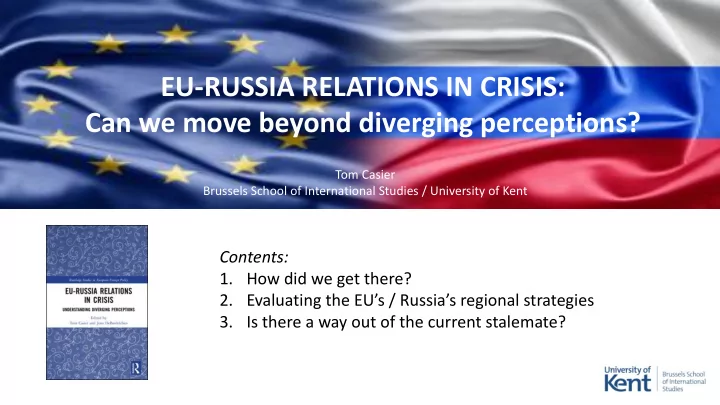

EU-RUSSIA RELATIONS IN CRISIS: Can we move beyond diverging perceptions? Tom Casier Brussels School of International Studies / University of Kent Contents: 1. How did we get there? 2. Evaluating the EU’s / Russia’s regional strategies 3. Is there a way out of the current stalemate?
‘When NATO approaches the borders of 1. How did we get there? the Russian Federation, you can say that there will be two military blocks, and this will be restoration of what we already 1.1 Structural reasons had.’ (Yeltsin, 1995) Different views of post-Cold War order in Europe • Wider Europe: enlargement of Euro-Atlantic structures (NATO, EU) • Greater Europe: multipolar ➢ Russian concerns over NATO enlargement; missile defence system; etc. BUT: largely remains in the margin of EU-Russia relations EU- Russia = ‘marriage of convenience’ (until Ukraine crisis 2014): Strategic Partnership , on basis of mutual recognition of interests 1.2 Dynamics ‘Logic of competition’ Marriage of convenience characterised by dwindling trust a) Linked to changes in Russian foreign policy b) Fuelled by ‘clash of integration projects’
a) Evolution of Russian foreign policy Constant ambition (since collapse of Soviet Union) to regain ‘great power’ status But strategy to reach this goal changes over time: 1. Externalisation of threats 2. From status quo to (neo-)revisionist power 3. From global military disengagement … over economisation of foreign policy … to global military reengagement < backed up by changes in power & driven by new foreign policy coalitions > using broad spectrum of power means b) Clash of integration projects • EU: Eastern Partnership (Association Agreements with ‘Deep and Comprehensive Free Trade’ and foreign policy alignment) • Russia: Eurasian Economic Union (Customs Union) ➢ key: incompatibility of both projects ➢ leads to distrust & perception of other as driven by inimical geopolitical intentions Rupture: different reading Euromaidan / annexation of Crimea / war in Eastern Ukraine > Suspension of EU-Russia Strategic Partnership & sanctions
Eastern Partnership “clear attempt by EU to build a sphere of influence” (Sergey Lavrov) Eurasian Economic Union “labels like ‘customs union’ cannot conceal Russia’s regional power ambitions” (Hillary Clinton)
2. Evaluating the regional strategies of the EU and Russia 2.1 Evaluating the EU’s regional strategy Decoupling of EU policy vis-à-vis former Soviet states • European Neighbourhood Policy (ENP, 2004) /Eastern Partnership (EaP, 2009): privileged relations • Strategic Partnership with RU ➢ Inherent tension between EaP/ENP and SP: - Eastern Partnership (EaP): privileged relations with neighbours - EU-Russia Strategic Partnership (SP): recognising Russian interests but Russia claims ‘privileged interests’ in former Soviet space ➢ Association Agreements & stability: agreements with 3 countries with territorial dispute ‘with’ Russia Relations with Russia & EU (dis)unity: • Russia traditionally highly divisive issue • Since Ukraine crisis: surprising unity (but increasing bilateral contacts) • Can EU maintain unity?
2.2 Evaluating Russia’s regional strategy Change in integration strategy: from Commonwealth of Independent States (CIS) to deeper integration with limited number of partners: Eurasian Customs Union (2010) >> Eurasian Economic Union, EAEU (2015) Russia, Belarus, Kazakhstan, Armenia, Kyrgyzstan New context after Euromaidan and regime change in Ukraine: a) Annexation of Crimea: Violation of European border regime: dangerous precedent b) Eastern Ukraine: Goals: weaken, confuse >> make Ukraine a liability for West Gains and losses: In shorter term Russia may be punching above its weight But potential high costs in longer term: isolation, insecurity, power, long term relations with Ukraine et al. ➢ Undermines credibility as honest broker in post-Soviet space and defender of international law & sovereignty ➢ Impact on confidence of & relations with EAEU states
3. Is there a way out of the current stalemate? 3.1 How to avoid running from crisis to crisis? In long term a conflictual approach (isolating Russia, reinforcing spheres of influence) risks to create continued instability < Russia driven by counter-hegemonic status seeking Need for a long term vision to move beyond dualistic structures: Scenario of ‘double, overlapping concentric circles’ in wider Europe Alternative for spheres of influence, that create hard dividing lines and polarisation while recognising contemporary realities • Concentric circles around ‘Brussels’ and ‘Moscow’ with diverging degrees of integration • Where outer circles overlap: compatibility of integration with Russia and EU > no exclusive allegiances -- requires in long term: -wider European free trade arrangements > compatibility EAEU & EU Association -rethinking Collective Security in Europe Conditions: • Minimally: confirmation of principles of European order (including border regime) • Rethinking further NATO enlargement
3.2 Can EU and Russia move beyond their different views on Ukraine? • Minsk II implementation -- problems: Three takeaways from Eastern Partnership Summit, Nov. 24th 2017 • Ukraine’s problem • Eastern Partnership ‘is not directed against Russia’ ( Tusk) • Russia’s problem • 20 deliverables: hardly any security issues • • Losing face New EU- Armenia ‘Comprehensive and Enhanced Partnership Agreement’ (CEPA) • Lack of trust • Gradual reduction of sanctions & normalisation? – long predicted, but few signs ➢ Current situation of sanctions and alternative bilateral contacts = the new normal? ➢ Or towards a ‘footnote scenario’ for Crimea: non -recognition of annexation but return to ‘business as usual’? Broader picture: • Remaining common interests of EU and Russia in pragmatic cooperation (see energy) • Russia’s alternatives are limited and fragile • But: difficulty of negotiating ‘grand bargain’ in current circumstances A profound change may require fundamentally new conditions • Domestic change? • External game changer?
Recommend
More recommend